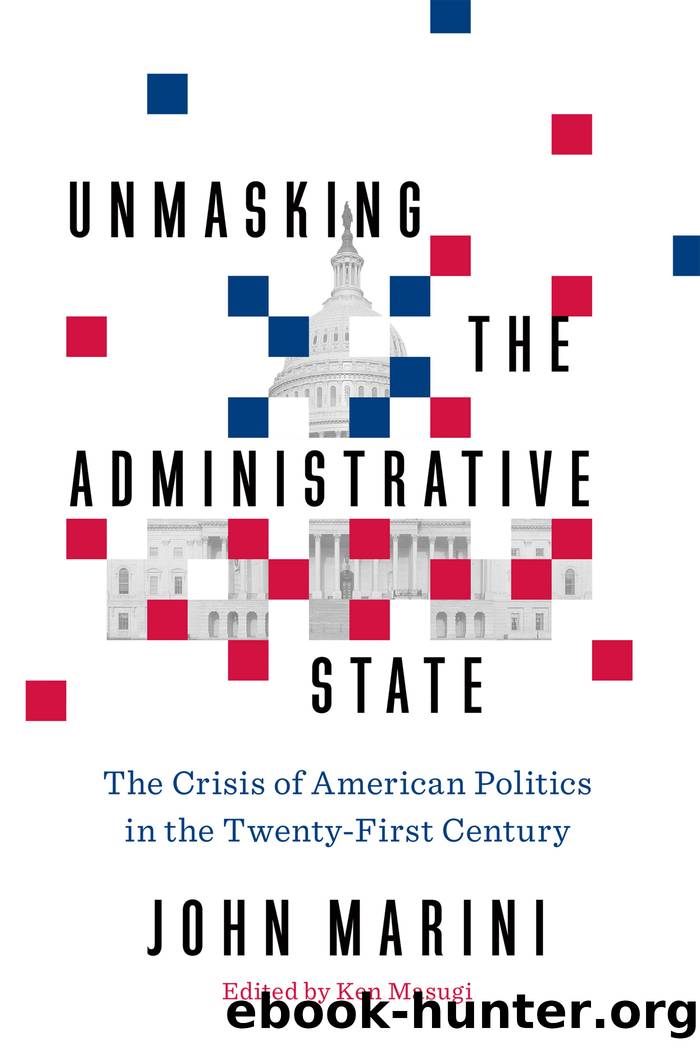Deconstructing the Administrative State by John Marini

Author:John Marini [Marini, John]
Language: eng
Format: epub
Tags: Nonfiction, Reference & Language, Law, Administrative Law & Regulatory Practice, Constitutional, Social & Cultural Studies, Political Science, Government
ISBN: 9781641770248
Publisher: Encounter Books
Published: 2019-01-29T05:00:00+00:00
10
On Harvey Mansfieldâs Jefferson Lecture: How to Understand Politics
HARVEY MANSFIELD WAS GIVEN the high honor of delivering the Jefferson Lecture in the Humanities in Washington in 2007.1 That privilege, not often given to a political scientist, is the highest honor the federal government confers for distinguished intellectual achievement in the humanities. This panel, in a much smaller way (and with the blessing of the American Political Science Association), is also an attempt to honor his achievement. We here, I think, understand and appreciate the importance of Harvey Mansfieldâs contribution to our understanding of politics. This discipline, which is perhaps reluctant to praise its most severe and honest critics, too, owes him a debt of gratitude not only for his scholarship, but for his extraordinary influence as a teacher as well. I need only look at the other presenters on this panelâI believe nearly all of them were his students at various times. Consequently, we have not only his work, but his influence on the many contributions of his students as well. In his lecture, Mansfield raised the question of how to understand politics by asking âHow to Understand Politics: What the Humanities Can Say to Science.â In doing so, he expressed his reservations concerning the dominant way of trying to understand politicsâthe scientific study of politics. The fundamental problem of a political science that seeks to be scientific in the manner of natural science is that it must ignore the question of importance, which he says âis the central question in politics.â âPolitics is about who deserves to be more important: which leader from which party with which ideas. Politics assumes that the contest for importance is important: in a grander sense it assumes that human beings are important.â
In the attempt to establish scientific truth as the ground of objective knowledge, political science has become dependent upon a method that seeks to comprehend only behavior, and only in the aggregate, and only on behalf of universal abstractions. In doing so, scientific political science alienates itself from what is of paramount importance in political life: the individual human being. âHuman beings and their associations always have names,â Mansfield says. âThey maintain their individuality by the use of proper names.â They might even have souls and may sometimes insist upon their own importance. Mansfield offers some suggestions for improving our understanding of politics. First, he thinks that political science should ârecapture the notion of thumosâ (spiritedness, a philosophic concept derived from Plato and Aristotle), which refers, he says, âto a part of the soul that makes us want to insist on our own importance.â The âsecond improvement,â he tells us, âis the use of namesâproper to literature and foreign to science.â âLiterature,â he says, âtells stories of characters with names, in places with names, in times with dates.â We come to understand in the course of his lecture that the humanities, understood broadly as philosophy, and history as well as literature, knows something that science does not: âthe human resistance to hearing the truth.
Download
This site does not store any files on its server. We only index and link to content provided by other sites. Please contact the content providers to delete copyright contents if any and email us, we'll remove relevant links or contents immediately.
The Secret History by Donna Tartt(19086)
The Social Justice Warrior Handbook by Lisa De Pasquale(12190)
Thirteen Reasons Why by Jay Asher(8909)
This Is How You Lose Her by Junot Diaz(6885)
Weapons of Math Destruction by Cathy O'Neil(6279)
Zero to One by Peter Thiel(5801)
Beartown by Fredrik Backman(5754)
The Myth of the Strong Leader by Archie Brown(5507)
The Fire Next Time by James Baldwin(5442)
How Democracies Die by Steven Levitsky & Daniel Ziblatt(5218)
Promise Me, Dad by Joe Biden(5153)
Stone's Rules by Roger Stone(5087)
A Higher Loyalty: Truth, Lies, and Leadership by James Comey(4960)
100 Deadly Skills by Clint Emerson(4924)
Rise and Kill First by Ronen Bergman(4788)
Secrecy World by Jake Bernstein(4752)
The David Icke Guide to the Global Conspiracy (and how to end it) by David Icke(4717)
The Farm by Tom Rob Smith(4507)
The Doomsday Machine by Daniel Ellsberg(4490)
